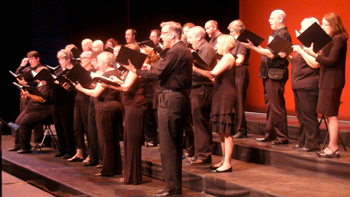by Daniel Hathaway

In between, the program offered an agreeable jumble of pieces ranging from William Mundy’s 16th-century A New Commandment to works by featured composer and Lakewood native David Conte, who was present to conduct his Candles in the Wilderness and I Dream a World. Lesser-known works by Ernani Aguiar, Vincent Persichetti, Frank Ticheli, René Clausen, Arvo Pärt, Gwyneth Walker, Stephen Schwartz, and Joan Szymko shared the stage with choral standards by Mendelssohn and Mozart.
Most of the works followed a general theme of world peace, human dignity, and hope. Though Aguiar’s Salmo 150, Persichetti’s Song of Peace, Pärt’s Da pacem Domine, and Szymko’s Ffe Mwe, Mwe Ffe (with a cameo appearance by percussionist Andrew Pongracz) provided Good Company with some technical challenges, more than a few — including the Conte pieces — were tailored expressly to the abilities of high school choirs.
Good Company negotiated these varied selections with generally good blend, diction, and intonation. A high point was Walker’s The Tree of Peace, sung sonorously by the women’s voices with solos by Marie Bielefeld, Chelsea Cross, Nancy Karabinus, and Melissa Jones, with Ruth Draper at the piano.
Mendelssohn’s gorgeous Verleih’ uns Frieden and Mozart’s lovely “Laudate Dominum” from the K. 339 Vespers were grouped together at the end of the program. Having sat silent through a succession of choral pieces, Amethyst Strings added a welcome and expressive change of sonority to the Mendelssohn and Mozart, though the lack of organ continuo — a conductorial decision, since the church’s organist was on hand — made the orchestration of the two works sound thin. Soprano Lauren Owens, the beautifully lyrical soloist in the Mozart, made the best of a treacherously slow tempo.
Good Company’s lavishly illustrated program included biographies of composers, and complete texts and translations of the afternoon’s works — printed in different places. Organizing these helpful items differently would have prevented much flipping back and forth during the concert.
Published on ClevelandClassical.com May 31, 2017.
Click here for a printable copy of this article



